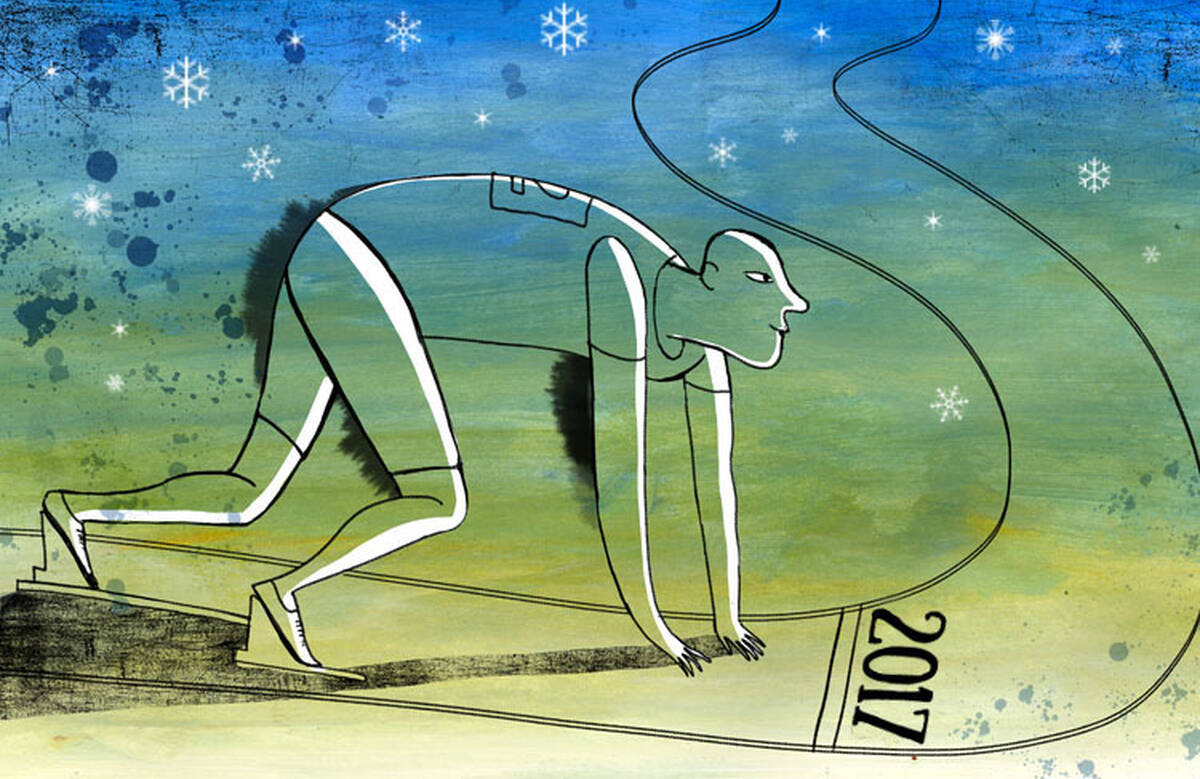Podcast Transcript
JESSICA LOVE: Welcome to 2017. Two Januaries ago, we asked a number of Kellogg professors what advice they had for listeners looking to make changes to their lives. And it turns out, their advice is as relevant today as it was in 2015. So please enjoy this podcast from our archives. And at the very end, you’ll learn something that may forever alter the way you think about the ever-lengthening holiday shopping season.
[music prelude]
JESSICA LOVE: Welcome to 2015. The new year is a good time to return that ill-fitting sweater and reckon with the damage you’ve done to your bank account over the holidays. It’s also a time for resolutions. Giving yourself goals is a great way to ring in the new, but a year is a long time. How do you stay motivated?
Speaker 1: When I have a long-term goal, what I do to stay motivated is to make sure that I have a core group of people that I can discuss these problems with to help me reflect and move forward.
Speaker 2: For me, when you have a goal, I just keep going and that’s it.
Speaker 3: Small daily goals, because for me, the big picture is kind of really overwhelming, like with New Year’s resolutions, stuff like that. Just tiny little goals that I can’t necessarily procrastinate on, because I will if I can.
[music interlude]
LOVE: Hello and welcome to Insight in Person, Kellogg Insight’s monthly podcast, produced by the Kellogg School of Management at Northwestern University. I’m your host, Jessica Love.
This month, we look at what it takes to start off 2015 right. Whether you’re trying to save money, become healthier, or make your company more efficient, we’ve got insights to help you, so stay tuned.
[music interlude]
BLAKE McSHANE: You know, like most things in life, when we
find ourselves with a task to complete, whether it’s being mired in debt
or anything else, a strategy to help us get out of that hole can really
help.
LOVE: That’s Blake McShane, an associate professor of
marketing at the Kellogg School. When McShane and his research
colleagues started to delve into what makes people more likely to
complete a task, a lot of strategies presented themselves.
McSHANE: One could proceed linearly, right? Just think about
the beginning, the middle, and the end, and proceed in that direction,
and lots of tasks lend themselves to that. Alternatively, you might
think about tackling your toughest task first or, for that matter, your
easiest task first.
LOVE: One common goal is to get out of debt, but juggling
multiple accounts with varying principles, interest rates, and payment
schedules can make coming up with a strategy a daunting task. The advice
we hear time and time again is to pay off your highest interest debts
first. This ensures that you pay the least amount of interest in the
long run, but it turns out this perfectly logical advice may not always
be the best. Here’s McShane again.
McSHANE: There’s another strategy, which has been called the
snowball strategy, or the snowball approach to debt, which takes the
idea of starting with your easiest task first. It says you should find
your smallest debt, and first pay that one off.
LOVE: Along with colleague David Gall, McShane studied people
who enrolled in programs with debt settlement firms. These firms
negotiate with creditors on debtors’ behalf, often getting them to
accept a much smaller lump sum than the amount they originally owed.
Since the debt settlement firms handle the haggling, participants in
this study had no control over the order in which their debts were paid
off. Still, order mattered when it came to motivation. Regardless of
interest rates, people whose smaller debts were paid off first were much
more likely to finish the program and eliminate all their debt. So
should people disregard interest rates when paying off debts and stick
to a smallest-to-largest strategy?
McSHANE: We wouldn’t say that you should absolutely disregard the interest rate on your debt.
LOVE: But, McShane says, within a specific class of debt, like
credit card debt or car loans, your interest rates are likely pretty
similar, so going after the smallest debt first within a specific class
of debt could be motivating.
McSHANE: Also, quite nicely, is that when you think of
different classes of debt, usually it’s the very, very big ones that
comes with smaller interest rates. So, for instance, your mortgage is
typically your biggest debt that you have, and usually those have much
smaller interest rates than something like a credit card.
LOVE: Why exactly is starting small a good choice for getting out of debt?
McSHANE: First of all, it’s the idea of getting a quick win.
It makes you motivated, it makes you feel pumped, and you’re ready to
continue doing what you’ve just successfully done. It also sort of
instills confidence. You think that, you know, maybe when you start the
task, you have no idea whether you can complete it, but the fact that
you got a win made you say to yourself, “Hey, I can do this now.” I
think in any long-term goal you might have, particularly one where
partial progress is not so important, then this idea of focusing on
checking items off the list can be really helpful.
[music interlude]
LOVE: Many of us enlist the support of those around us when
tackling long-term goals. If we set out to lose 10 pounds in 2015, we
might make sure our family and friends know not to tempt us with sweets
and French fries. It turns out this strategy can backfire.
Eli Finkel is a professor of management and organizations at the
Kellogg School. His research points to a phenomenon he calls
self-regulatory outsourcing. This means that when we work on reaching a
goal with the help of another person, there is a risk that we come to
depend on that person’s help so much that we let our own efforts flag.
ELI FINKEL: When people help us in a way that makes it clear
that we don’t have to work as hard, we take that as a signal that in
fact we don’t have to work as hard.
LOVE: In one study, Finkel looked at women in romantic
relationships who wanted to lose weight. One group of women was asked to
think about how their partners help them with their weight-loss goals.
Another group was asked to think about how their partners helped with
their career goals. Afterwards, both groups were asked how much time
they plan to spend working out the following week. It turns out that the
women who thought about their partner’s help with weight loss planned
to work out less than the women who thought about their partner’s help
with their careers.
FINKEL: Because you can think about how somebody else might
help you achieve that goal, it frees you up to think about or to use
your resources, your goal-pursuit resources, on other goals rather than
that goal. Then, consequentially, it has this ironic undermining effect,
such that thinking about how somebody else helps you achieve a
weight-loss goal actually makes you lazy.
LOVE: That doesn’t mean you shouldn’t enlist people to help
you achieve your goal. It’s all about how they approach their role as
supporter.
FINKEL: The crucial distinction is the way we offer help, and
in particular, when we offer help to other people, do we offer it in a
way that promises to substitute for their own effort versus promises to
support their own effort? A husband might make sure he does all the
healthy cooking to help his wife lose weight, for example, but the
better way to provide social support, and to help people achieve their
goals, is to mention, “I’m here, I’m hanging back, and you can count on
me if you need it, but I’m not going to be intrusive. I’m not going to
get in the way or take over the pursuit of the goal. I’m just going to
be here to support you and encourage you.”
[music interlude]
LOVE: If you’re someone who sets incremental goals to help you
achieve big ones, you’ll be pleased to hear how you can trick yourself
into taking that next step. Kellogg School associate professor of
marketing Miguel Brendl has found that how we measure our progress
toward a goal can impact motivation.
MIGUEL BRENDL: We need to take a step back and ask, “What
motivates people?” One thing they do is they constantly ask themselves,
maybe not consciously, but in the background somehow, “How valuable is
it to take the next step?”
LOVE: He finds that, while pursuing a goal, we make continual
calculations. How much is the next step going to accomplish compared to
how far I’ve already come or how far I have left to go?
Let’s say you have a goal to run ten miles. After you run the first
mile, you calculate what that second mile is worth. One mile to run
versus the one mile you’ve already finished. That ratio is 1:1, meaning
that second mile is pretty valuable. At mile nine, you make the same
calculation, but this time you focus on how close you are to finishing.
Since you only have one mile to go, the value of that last mile is very
high. This knowledge pushes you to the end.
BRENDL: This is just perception. You know, we normally think
of in motivation is, “How much willpower do I have to force myself to
move on?” It’s not about willpower; it’s just perception of the sizes of
things.
LOVE: Switching your perception of your progress from how much
you have completed to how much you have left works well at the
beginning and the end of a task. But in the middle, you’re far from both
ends and that next step doesn’t seem so valuable anymore.
BRENDL: We call it, “stuck in the middle.”
LOVE: The way to get unstuck, Brendl says, is to set sub-goals
for yourself. Let’s say your 2015 resolution is to save $8000, so you
need to squirrel away about $650 a month. In January, no problem. You’re
super motivated. February is probably pretty easy too, but what about
when you get to July? By then, you’ve saved nearly $4000. That next $650
doesn’t feel as valuable compared to either the $4000 you’ve saved or
the $4000 you have left to go, so you set yourself a sub-goal to get
past that $4000 hump.
BRENDL: Maybe they could reward themselves and say, “okay, if I
hit $5000, I’m allowed to go out and have a nice dinner.” Then they
will be focused on that and they may save a little less because they
spent the money on the dinner, but then are more likely to save the
entire goal.
[music interlude]
LOVE: We’ve been talking about ways you personally can
accomplish your goals in the new year. But how about retailers that have
their own goals, like selling out all of the holiday merchandise they
stocked? If you walk into the mall this week to use up those gift
certificates you got for the holidays, you’ll probably notice some
stores packed with 50 percent off signs, return-seeking customers, and
scrambling employees, while others appear almost completely dead. The
dead stores probably did a much better job of managing the holiday rush:
they better predicted total customer demand and, more importantly, just
what customers were demanding. Here’s Sunil Chopra, a professor of
Managerial Economics and Decision Sciences at the Kellogg School.
CHOPRA: It’s relatively—relatively speaking—easier to prepare
for a total demand that will arise and the total need for staff, because
total sales become much more predictable. What is much harder to do is
figure out which are going to be the winners and losers because you have
so little time to react if you guessed wrong.
LOVE: That’s right. Retailers’ biggest challenge isn’t volume
but timing. People like to lament how the holiday shopping season seems
to stretch longer and longer each year. We generally chalk this trend up
to retailers wanting people to spend more. This is undoubtedly true.
But the biggest benefit to a longer holiday shopping season for
retailers may be that they have more time to get the right products into
the store. Here’s Professor Chopra again.
CHOPRA: What you’d like to do is, as early as possible, get a
sense of where the market is going. Waiting till Black Friday to have
your first taste of what Christmas shopping is going to look like is too
late, because you’ll have less than four weeks to react and arrange for
supply if you guessed wrong. It’s impossible. On the other hand, you
run in early November, late October—so the earlier things move, I get a
second chance to react, which corrects my predictions quite
significantly. Because from a retailer’s perspective, the best possible
outcome after the holiday rush is that they have nothing to do.
[music interlude]
LOVE: This program was produced by Jessica Love, Fred
Schmalz, Emily Stone, and Michael Spikes. Special thanks to Kellogg
School of Management faculty Miguel Brendl, Sunil Chopra, Eli Finkel,
and Blake McShane, as well as Northwestern students including Jose
Martinez and Elizabeth Frieda, who shared how they stayed motivated. You
can stream or download our monthly podcast from iTunes or from our
website, where you can find articles on debt consolidation, motivation,
and supply chain management, in addition to plenty of other business
insights. Visit us at insight.kellogg.northwestern.edu. We’ll be back
next month with another Kellogg Insight podcast.



